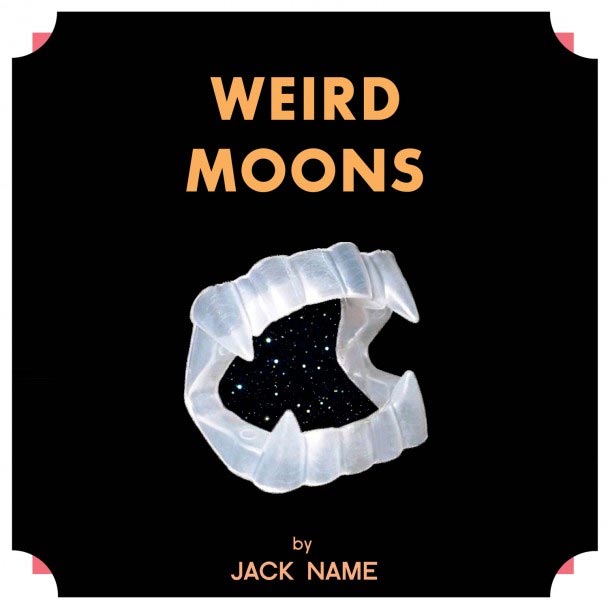Effortlessly eternal, Jack Name’s Weird Moons harnesses the same joyous commitment to polyglot musical experimentalism of the likes of Thee Oh Sees and Ty Segall. Simultaneously evoking both the creaky wonder of lo-fi bedroom recordings and the organic richness of early 1970s “big board” recording studios, such as L.A.’s Sound City, it displays a masterful understanding of both songwriting and audio craft. These elements, coupled to his obvious exuberance at the creative potential of the arts at his disposal, make for an intoxicating and powerful mix.
Enigmatic, and prone to the same promiscuity of naming that keeps fans of the Parquet Courts on their toes, Jack Name has released recordings under several different monikers. This choice is, we are told, a conscious one, reflecting as it does his current feeling that, regardless of status (he has worked with the likes of Ariel Pink, Cass McCombs and Tim Presley), his identity is only as important the sonic explorations he undertakes.
It is fitting then that this man of many appellations should make such an album as this, with its many facets and styles.
The Mothers, Suicide, early Pink Floyd, early Neil Young, The Eagles, Syd Barrett, The Human League, Aphex Twin, Gong; if you want to waste your time, it is possible to detect snippets and influences from a huge range of artists. To do this, however, would miss the point. This album is not an assemblage of blankly drawn caricatures that relies on notions of recognition to make it work. On the contrary, Weird Moons is in fact a work of reinvention, in the great tradition of musical experimentation, that stands outside and beyond constraints of genre and era to give us something new and fresh. Aware of legacy and history, Name uses an awareness of the musical canon to produce something more robust and groundbreaking. In this, he is treading a path well trod, as artists have always used reinterpretation and recontextualisation of the seminal to invent things anew.
 Although there are a multiplicity of stylistic references throughout, these occur more as sounds absorbed and enjoyed, triggers for inspiration, rather than stale facsimiles. Be it the eerie ’60s psychedelia of “Werewolf Factory”, with its plodding, slack bass and echoey guitar melody lines juxtaposed with odd vocal harmonies, or the dark-tech early ’80s electronic fuzz of “Watcher Talk”, this is an album of oblique turns and skillful balance. Throughout, despite the wide ranging nature of the musical cues, hegemony and integrity are maintained.
Although there are a multiplicity of stylistic references throughout, these occur more as sounds absorbed and enjoyed, triggers for inspiration, rather than stale facsimiles. Be it the eerie ’60s psychedelia of “Werewolf Factory”, with its plodding, slack bass and echoey guitar melody lines juxtaposed with odd vocal harmonies, or the dark-tech early ’80s electronic fuzz of “Watcher Talk”, this is an album of oblique turns and skillful balance. Throughout, despite the wide ranging nature of the musical cues, hegemony and integrity are maintained.
All in all, there is something unearthly about the recent music of Jack Name. Where his album Light Show, which appeared in early 2014 on Drag City, is described as lifting off over an alien planet, this release is perhaps best seen as an exploration of our own planet’s underworld of occult creatures, religion and spooky happenings: a place where a new moon is a portent supernatural occurrences and mysterious forces hold sway. With references to a range of sources, from Greek mythology to the Old Testament, it appears that the intellectual muses are as wide ranging as the musical ones and that their deployment is equally free.
Download the lyrics for Weird Moons
A good example of this are the lyrics for the track “Running After Ganymede”. Driven by a desire to explore his concerns with the primacy of creativity over status and label, the artist appears to evoke ancient Greek myth: Humble Ganymede, tended sheep as a boy before being abducted by Zeus and taken to the home of the Gods, Mount Olympus. Once there Ganymede is given the task of cupbearer to the Gods and, in poetic terms, became a symbol for the beautiful young male who attracts desire and love.
For these purposes, Ganymede may be seen as an archetype for someone propelled upwards and away from their modest origins into an alien world of Gods and super-beings where he is desired and courted for his more superficial attributes. Containing the biblical Watchers, deep space exploration and the aforementioned ancient Greek mythology, the confused origins of the lyrics of this song serve only to enhance to potency of the track. It is also worth noting that Ganymede is also the name of a satellite of Jupiter and the largest moon in the solar system.
Whatever the intent or explanation, this is a beguiling track that, like the rest of Weird Moons, keeps you guessing both musically and conceptually. Essentially postmodern in its use of all and everything in the pursuit of expression it avoids the the pit falls of cold, awkward self-consciousness that can come with this approach.
Engaging from the first listen, Weird Moons rewards more with each and every play.

Ω






